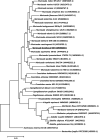Muricauda brasiliensis sp. nov., isolated from a mat-forming cyanobacterial culture
- PMID: 33155174
- PMCID: PMC7966608
- DOI: 10.1007/s42770-020-00400-3
Muricauda brasiliensis sp. nov., isolated from a mat-forming cyanobacterial culture
Abstract
Strain K001 was isolated from a cyanobacterial culture derived from Abrolhos, a reef bank microbial mat (South Atlantic Ocean-Brazil). Cells of K001 are Gram stain-negative, catalase and oxidase-positive, non-motile, rod-shaped, and with or without appendages. Phylogenetic analysis based on 16S rRNA gene sequences showed that strain K001 belongs to the genus Muricauda. The highest strain K001 16S rRNA gene identity, ANI, and dDDH, respectively, are with M. aquimarina (98.90%, 79.23, 21.60%), M. ruestringensis (98.20%, 80.82, 23.40%), and M. lutimaris (97.86%, 79.23, 22.70%). The strain grows at 15-37 °C and between 0.5 and 10% NaCl. The major fatty acids of strain K001 are iso-C15:0, iso-C15:1 G, iso-C17:0 3-OH, and summed feature 3 (C16:1 ω6c and/or C16:1 ω7c). The polar lipids are represented by phosphatidylethanolamine, three unidentified aminolipids, and three unidentified polar lipids. The major respiratory quinone is MK-6. The G+C content of the DNA of strain K001 is 41.62 mol%. Based on polyphasic analysis of strain K001, it was identified as a novel representative of the genus Muricauda and was named Muricauda brasiliensis sp. nov. The type strain is K001 (=CBMAI 2315T = CBAS 752T).
Keywords: Abrolhos reef bank; Cyanobacterial culture; Flavobacteriaceae; Muricauda brasiliensis.
Conflict of interest statement
The authors declare that they have no conflicts of interest.
Figures



References
-
- Dang Y, Sun Y, Sun L, Yuan X, Li Y, Qin Q et al (2019) Muricauda nanhaiensis sp. nov., isolated from seawater of the South China Sea. Int J Syst Evol Microbiol 69:2089–2094. 10.1099/ijsem.0.003437 - PubMed
MeSH terms
Substances
Grants and funding
LinkOut - more resources
Full Text Sources
Molecular Biology Databases

